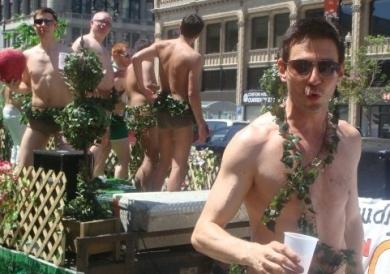There won’t be any queer pride at one of Canada’s most famous intersections this summer. The Pride parade in Winnipeg is being dramatically shortened, and it means marchers won’t pass by Portage and Main.
“That’s the focal point of Winnipeg,” says a frustrated Mike Law, organizer of a popular float that’s pulling out of the June 6 parade because of the change. “It’s a symbolic thing.”
In years past, Winnipeg’s Pride parade has lasted more than an hour and headed down several big downtown streets. This year, it’s being chopped down to just one street, for a total of nine blocks. The march will start at the Manitoba Legislature, continue down Broadway, then end at the Forks for a concert and business fair.
“The decision is being universally panned,” says Law. For evidence of dissent, just check out Winnipeg Pride’s Facebook page. Ash Lund writes, “What’s up with the new route? The whole point of the Pride march is to show our pride and by shortening the route it kinda makes me think they want to keep us off the busiest street of Winnipeg.” Ashley Dawn Booth adds, “This is my fourth year at Pride and the best part of it was always the walk down the great street of Portage where everyone could see us loud and proud.”
As soon as Law caught wind of the change, he fired off a letter to Pride that suggested an alternate route. He got a four-point response from Winnipeg Pride chair Barb Burkowski. Here’s a summary:
1) There’s a Winnipeg Goldeyes baseball game happening in the area at roughly the same time, causing potential traffic problems.
2) The Pride committee wants to eliminate as many turns as possible in the parade route because, as Burkowski writes, “the safety of parade participants is in great jeopardy when we have more corners.”
3) The new route forces all spectators to gather along one street, thus making it look like the parade has more support.
4) A shorter parade route means everyone will arrive at the festival sooner and see musical acts like pop diva Deborah Cox.
Law says he was told by a Pride committee member that the local baseball team tried to cut a deal with Pride about the start time of the game, but it couldn’t be done. As for the safety reason, Law feels it’s “bogus.” He points out that every float is required to have four trained marshalls. “What parades don’t have corners?” he says. “I don’t think there’s ever been an incident. It’s a red herring to me.”
In Burkowski’s response to Law, she wrote, “The board debated the options which were challenged from many directions and came to the current decision after much discussion. The permits are submitted, the insurance is set up and all systems are go for the parade as we have planned it this year. There will be no changes.”
Last year, the Pride parade attracted floats for about two dozen organizations, including Law’s Goldenboys Volleyball League. This year, Law says it’s not worth the $800 cost of renting a truck and speakers, decorating a float and putting it on the road.
“It’s really disappointing,” says Law. “I hope they learn from their mistake and do a better parade route next year.”
The Winnipeg Pride committee didn’t respond to interview requests for this article.
2010 PARADE ROUTE: BLUE; 2009 PARADE ROUTE: RED
THE PARADE ROUTE MAY BE SHORTER BUT…
Winnipeg Pride organizers are promising a bigger, better Pride festival this year, with a new venue — the city’s centuries-old meeting place, the Forks. Several musicians are performing at the site’s Scotiabank stage on June 6, including Deborah Cox. The gay-friendly pop diva will also be singing that night at the official Pride dance party.
Starting May 27, there are many other events leading up to Pride Day, including a softball tournament, a roller derby and a queer spelling bee. Everything is listed in the Pride committee’s glossy 64-page Pride Guide.
Well, almost everything. When Stacy Clark asked for her June 6 dance party, Queer Pride, to be included in the guide, the Pride committee refused. It said Clark’s event was in competition with the committee’s annual dance party (the one where Cox is performing), which acts as a fundraiser for Pride itself.
“I’m disappointed and frustrated,” says Clark. “Queer Pride caters to a completely different crowd.” The Pride committee’s party is widely known as ‘the sweaty boys’ social,’ while Clark’s party at Lo Pub is aiming for a more female, low-income crowd. (Her event costs just $5 to enter, versus $25 for the official Pride party.)
“If Pride is a community-based organization and the Pride Guide is a community service, then everyone should have fair and equal access,” says Clark. Despite the snub, she and her small team of DJs are going on with the show. Clark is now putting up posters with this slogan: “The event the Winnipeg Pride society does not want you to know about!”

 Why you can trust Xtra
Why you can trust Xtra


